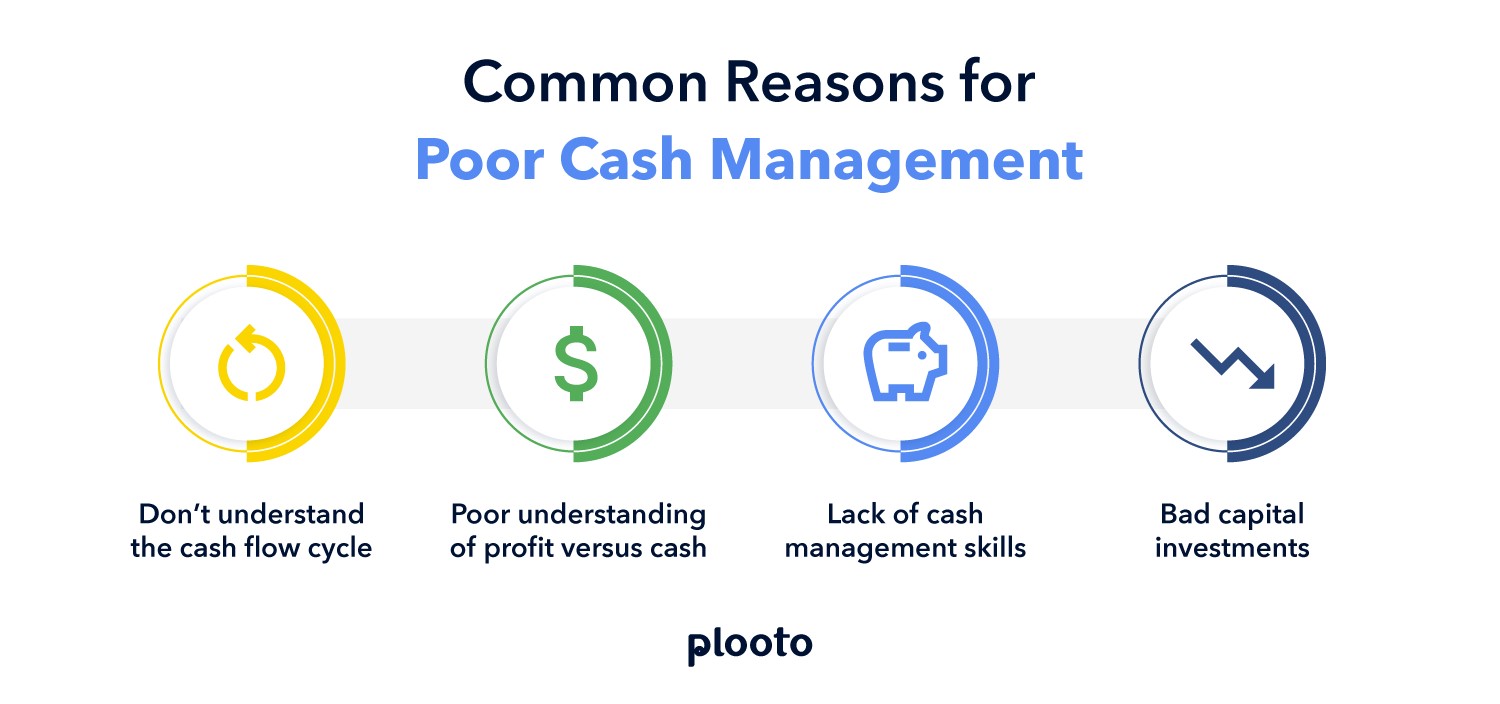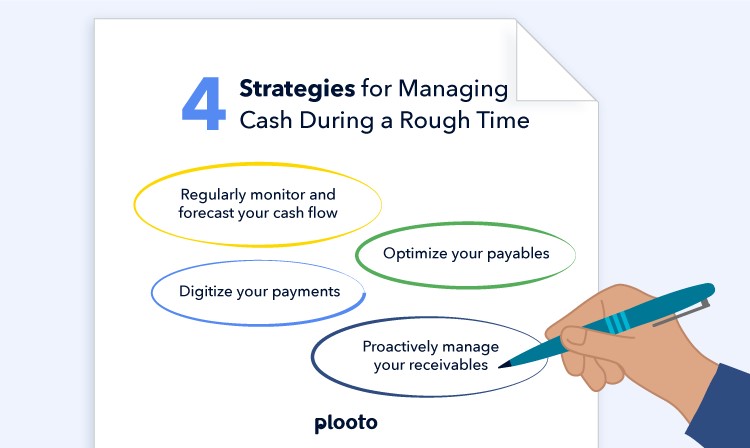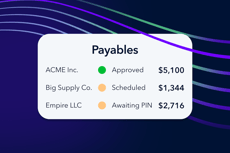
Smart cash management strategies are required for businesses of all sizes to succeed. Small businesses are particularly vulnerable to running out of cash due to economic downturns, poor cash flow management, and inadequate long-term planning.
It’s clear that cash flow management plays a crucial role in helping businesses grow. Let’s get into why cash management is a problem in the first place, ways you can address concerns now, and how you can protect your organization in the future.
Sign up for a Free Trial today
SHORTCUTS
- How managing your cash flow affects the future of your business
-
The importance of cash management during an economic downturn
-
4 strategies for managing cash during a rough time
Small business cash management can be challenging
According to CB Insights, 38 % of small businesses fail because they run out of cash. These cash flow issues can happen due to multiple reasons but in this section, we will cover four key aspects: not understanding the cash flow cycle, poor understanding of profit versus cash, lack of cash management skills, and bad capital investments.

Common reasons for poor cash management
Let’s break these reasons down one by one.
Don't understand the cash flow cycle
Small business owners, especially those that have started a business for the first time, may not be aware of cash flow best practices. This can cause issues in implementing an efficient way to deal with account payables, account receivables, and other aspects of the cash flow cycle that may contribute to an unhealthy cash flow.
Poor understanding of profit versus cash
Some small businesses may confuse profit with a healthy cash flow. It’s critical to understand the difference between profit and cash flow. Profit is revenue minus expenses while cash flow is cash that goes in and out of your business during a certain time period.
Lack of cash management skills
Cash management skills are related to understanding the cash flow cycle. If small businesses do not understand the cash flow cycle, they may also have issues with cash flow forecasting and understanding the various types of cash flows you must track for your business.
Bad capital investments
Bad capital investments can not only be a current wasteful use of company funds but can also create long-term cash flow problems for companies, especially for those that are not regularly cash flow positive and susceptible to market forces.
3 tips for effective cash management
Now that we’ve covered some of the cash management issues small businesses (and in most cases other types of businesses) face, let’s get into ways to improve cash flow management.
1. Create forecasts that account for unexpected situations
Cash flow forecasting is a great tool that business owners can use to protect their businesses in the long term. However, as you get into the habit of forecasting, make sure that you give yourself some leeway for unexpected situations. Examples of unforeseen events could be instances such as a vendor backing out of a deal, a departure of a star revenue generator, and so forth.
2. Delay cash outflows when possible
A standard piece of advice in cash flow management is to extend the timelines of your account payables. This means that if there are no monetary incentives for your business to pay early, try to delay your cash outflow.
3. Keep inflows timely and predictable
The second part of cash flow management 101 is to ensure that your account receivables are on time or early. You can also provide small incentives to your vendors/ customers to pay you earlier. Keep your cash flow consistent and on time.
Maintaining healthy AR turnover ratios and AP ratios is a great way to make your cash flow predictable.
How managing your cash flow affects the future of your business
Cash flow management and cash flow forecasting can significantly affect the future of your business. Firstly, if you are not managing your cash flow effectively in the short term, this will mean that you will definitely have to deal with cash flow issues in the long term. Short-term cash flow issues can be due to multiple reasons, whether it be seasonal fluctuations in your business, a large customer who can't pay, jump in customer churns, or unexpected capital repair costs.
If these short-term cash flow problems are not addressed and then accounted for in future planning, they will continue to be issues. Additionally, long-term cash flow issues like the ones we have discussed in this article above can also affect the future of your business by affecting its agility to address new business requirements and your business’s aspirations for growth.
What you should do if you have a cash flow deficit
If you find that your business does not have the best financial health and finds itself in a cash flow deficit, there are a few avenues you can take. Two tips we’ve already discussed apply in this situation, delay your account payables and speed up your account receivables as your situation allows. Some other things your company can do include a short-term line of credit to stabilize your accounts, a cut of expenses, and a sale of non-essential assets.
Until now, we’ve been discussing how cash flow management should work for a small business. Let’s now discuss how things change if you are in an economic downturn.
The importance of cash management during an economic downturn
Cash flow management becomes increasingly important in economic downturns. Recessions can cause short-term and long-term cash flow issues. Thus your business should start to prepare when economic indicators hint at a downturn. As discussed in this article, your business must follow the basics of cash flow management before and during the economic downturn. Let's now discuss three aspects that are especially important to keep in mind during an economic downturn.
Timing matters
Small businesses must account for timing when considering cash flow. Timing can matter in terms of when cash comes in or goes out on a basic level. Specific examples of this include the timing of investing your cash into operations, timing your capital raise, and timing any other significant business moves. You must always think short-term and long-term to get your timing right.
Calculating cash
Small businesses must ensure that they have a daily view of liquid cash. Your accounting records can be tracked on a cash basis or accrual basis. Small businesses can use cash basis accounting to recognize actual cash payments and collections, regardless of when earned or incurred.
Creating a realistic cash flow budget
Once a small business understands how liquid cash is on hand, your business can create a more realistic cash flow budget. You need to understand your current cash flow and what the next few months will look like through cash flow forecasting. Constantly reassess as the market situation changes to avoid a cash crunch.

4 strategies for managing cash during a rough time
Let’s now discuss what your small business can do to manage your cash during rough times.
Regularly monitor and forecast your cash flow
As discussed throughout this article, understanding your cash flow cycle is essential for your business. However, more than understanding your cash flow cycle and looking at the basics of cash going in and out is required. Your small business must make sure that you are constantly monitoring your cash flow and re-forecasting as situations change. In the case of a recession or a rough period for your business, you must account for these scenarios beforehand and adjust your business practices.
Digitize your payments
Digitizing your payments can play a key role in saving time and money for your business. Accounts payable and receivable automation software can help you digitize these payments and can enable you to focus on creating a positive cash flow company that can more easily scale. Digitizing before or during a rough time can help your business open new revenue streams, can help you reconcile your books faster, and can help you get a better sense of your financial health during a troubling time.
Optimize your payables
International payments, check payments, CRA payments and domestic payables can all be optimized using accounts payable automation softwares. Automation softwares like Plooto can do this by creating faster workflows, automating payables to vendors and by giving you a real time view on your AP and AR so that you can better manage your cash.
International payments, check payments, CRA payments, and domestic payables can all be optimized using account payable automation software. Automation software like Plooto can do this by creating faster workflows, automating payables to vendors, and by giving you a real-time view of your AP and AR so that you can better manage your cash.
Proactively manage your receivables
Accounts receivable automation software can help in the same way as payable software. This is done through automating payables and giving your customers more choices in how they can pay you so you can reconcile your books faster.
The principles of cash flow management for small businesses and businesses of other sizes are the same. Small business owners must thoroughly understand their cash flow to make adjustments that protect their business in the short and the long term. When a small business does this correctly, it can weather the storm of economic downturns by applying the same cash flow concepts but with a high degree of awareness due to a small business's vulnerability to market forces.
That's it from us! We hope the article gives you a better sense of how cash flow management can help your small business survive no matter what conditions you find yourself in!
CHAPTERS
00 Why Effective Working Capital Management Can Improve Your Entire Business
01 How to Ignite Your Company’s Growth With Working Capital
02 Proven Strategies for Optimizing Your Cash Management
03 Unlock the Power of Spend Management: A Guide for Small and Mid-Size Businesses
04 Liquidity Management Is Crucial to Succeeding in Today’s Hyper-Fast Environment
05 Cash management strategies for small business survival













